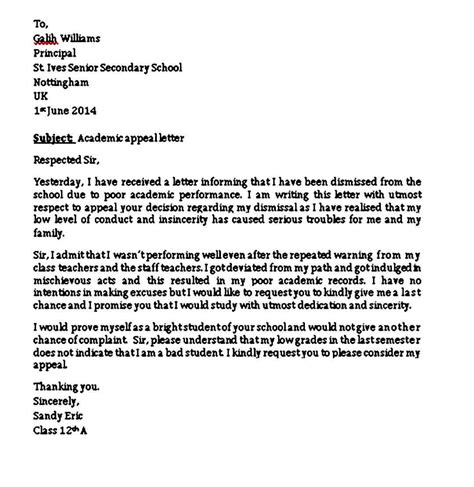Writing An Appeal Letter + Examples

Appeal letters are written to contest a decision made against an individual or a group of people. They are used to request a reconsideration of a decision that has been made. Appeal letters are used in various situations, such as in academic circles, legal forums, and employment settings. Writing an appeal letter can be a daunting task, but it is important to get your message across effectively. In this article, we will guide you on how to write an appeal letter, provide examples, and answer frequently asked questions.
1. Understand the Purpose of an Appeal Letter
Before you start writing an appeal letter, it is essential to understand its purpose. The main goal of an appeal letter is to convince the recipient to reconsider their decision. Therefore, your letter should be concise, clear, and persuasive. An appeal letter should be written with a professional tone and should avoid being emotional or confrontational.
Example:
Dear Admissions Committee,
I am writing to appeal the decision to deny my admission to XYZ University. I have always dreamed of attending XYZ University and believe that it is the perfect fit for me. I understand that my academic record does not meet the requirements set by the university, but I am confident that I can succeed if given the opportunity.
2. Research the Appropriate Channels for Appeal
It is important to research the appropriate channels for appeal before you start writing your appeal letter. This will ensure that your letter is directed to the right person and has a higher chance of being considered. In academic settings, it is usually the dean or the head of the department who reviews appeal letters. In legal settings, the appropriate channel may be a judge or an appellate court.
Example:
After researching the appropriate channels for appeal, I have learned that the appeal should be directed to the Admissions Committee.
3. Follow the Appropriate Format
It is important to follow the appropriate format when writing an appeal letter. The format usually includes a header, salutation, body, and closing. The header should include your name, address, and contact information. The salutation should be formal, such as “Dear Admissions Committee.” The body should be structured with an introduction, the main content, and a conclusion. The closing should be respectful, such as “Sincerely” or “Respectfully.”
Example:
Header:
John Doe
123 Main Street
Anytown, USA 12345
Phone: (123) 456-7890
Email: johndoe@email.com
Salutation:
Dear Admissions Committee,
Body:
Introduction: I am writing to appeal the decision to deny my admission to XYZ University.
Main content: (explain the reason for appeal, provide evidence, and make a persuasive argument)
Conclusion: I appreciate your time and consideration and hope that you will reconsider your decision.
Closing:
Sincerely,
John Doe
4. Provide Supporting Evidence
It is essential to provide supporting evidence when writing an appeal letter. This evidence should back up your argument and convince the recipient that your appeal is valid. The evidence may include transcripts, letters of recommendation, medical records, or any other relevant documents.
Example:
I have attached my transcripts and letters of recommendation to this appeal letter. These documents show that I have the academic ability to succeed at XYZ University. Furthermore, I have participated in various extracurricular activities that demonstrate my commitment to the university.
5. Be Polite and Professional
When writing an appeal letter, it is important to maintain a polite and professional tone. Avoid being emotional or confrontational, as this may harm your chances of success. Be respectful and use appropriate language throughout the letter.
Example:
I understand that the decision to deny my admission was made after careful consideration. However, I believe that I have the ability to succeed at XYZ University and would be grateful for the opportunity to prove myself. I appreciate your time and consideration and thank you for your attention to this matter.
6. Edit and Proofread Your Letter
Before submitting your appeal letter, it is important to edit and proofread it carefully. Check for spelling and grammatical errors, and ensure that the letter is formatted correctly. You may also want to ask someone else to review your letter for feedback.
Example:
I have reviewed my appeal letter several times to ensure that it is free of errors and formatted correctly. I have also asked my academic advisor to review the letter for feedback and have incorporated their suggestions.
Conclusion
Writing an appeal letter can be a challenging task, but it is essential to get your message across effectively. By following the appropriate format, providing supporting evidence, and maintaining a polite and professional tone, you can increase your chances of success. Remember to edit and proofread your letter carefully before submitting it.
FAQs
Q: What is an appeal letter?
A: An appeal letter is a written request to reconsider a decision that has been made. It is used in various settings, such as academic circles, legal forums, and employment settings.
Q: What should I include in my appeal letter?
A: Your appeal letter should include an introduction, the main content, and a conclusion. It should be structured with a formal salutation, supporting evidence, and a respectful closing.
Q: How do I research the appropriate channels for appeal?
A: You can research the appropriate channels for appeal by contacting the relevant institution or organization or by consulting their website or handbook.
Q: How long should my appeal letter be?
A: Your appeal letter should be concise and to the point. It should not exceed one or two pages.
Q: Can I submit additional supporting evidence after I have submitted my appeal letter?
A: It depends on the institution or organization. Some may allow you to submit additional supporting evidence, while others may not. It is important to check their policy before submitting your appeal letter.
